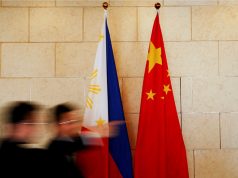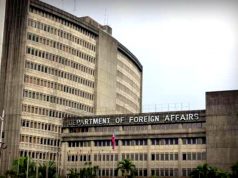
SINGAPORE — The U.S. and Chinese defense chiefs locked horns on Taiwan in their first face-to-face meeting in two years on Friday, while Philippines President Ferdinand Marcos Jr slammed “illegal, coercive actions” in the South China Sea, a clear censure of Beijing.
READ: Marcos slams illegal actions in South China Sea
The exchanges at the Shangri-La Dialogue in Singapore, Asia’s biggest defense forum, came amid reports that Ukrainian President Volodymyr Zelenskiy would fly in to attend the meeting on Saturday.
He is expected to try to drum up support for a Ukraine peace conference to be hosted by Switzerland in mid-June. Russia has not been invited and China has confirmed it will not attend.
Zelenskiy has urged U.S. President Joe Biden to attend, but Washington has not confirmed who it will send.
U.S. Defense Secretary Lloyd Austin and China’s defense minister, Dong Jun, met on the sidelines of the Singapore conference earlier in the day, reiterating their differences on Taiwan and other issues but emphasizing the need to keep military-to-military communications open.
READ: In Asia, Pentagon chief Austin seeks to reassure allies and cool China tensions
Austin expressed concern about Chinese military activity near Taiwan, including after the island’s presidential election and the inauguration of President Lai Ching-te this month, U.S. Air Force Major General Patrick Ryder said in a statement.
“The secretary expressed concern about recent provocative PLA activity around the Taiwan Strait, and he reiterated that the PRC should not use Taiwan’s political transition – part of a normal, routine democratic process – as a pretext for coercive measures,” Ryder said after the 75-minute meeting.
He was referring to the People’s Liberation Army and the People’s Republic of China.
Dong warned Austin that the U.S. should not interfere in China’s affairs with Taiwan, defense ministry spokesperson Wu Qian told reporters. China claims the democratically governed island as its own territory.
The U.S. approach to Taiwan violates commitments made by the United States and sends the wrong signal to “separatist forces” in Taiwan, the spokesperson quoted Dong as saying. Beijing calls the new president, Lai, a “separatist”.
A senior U.S. defense official, speaking on condition of anonymity, said the meeting marked an “important step” in opening lines of communication.
The official said Austin was “firm but professional” and also brought up China’s nuclear, space and cyber developments.
The two sides also discussed the South China Sea and the conflicts in Ukraine and Gaza.
South China Sea dispute
Marcos, making a keynote address at the meeting, said that the Philippines and other Southeast Asian countries had a vision for “peace, stability, and prosperity” in the disputed South China Sea, but that this was being undermined by other actors, although he did not name China.
“Illegal, coercive, aggressive, and deceptive actions continue to violate our sovereignty, sovereign rights, and jurisdiction,” Marcos said.
Encounters between the Philippines and China in Asia’s most contested waters have grown more tense and frequent over the past year as Beijing presses its claims on shoals sitting in waters that Manila says are well within its territory.
China’s coast guard has stepped up so-called “grey-zone” activities such as use of water cannons, collisions and ramming tactics to try to stop the Philippines patrolling and resupplying its troops.
The Philippines’ dispute with China coincides with an increase in its security engagements with the United States under Marcos, including expansion of U.S. access to Philippine bases. The U.S. and the Philippines are treaty allies.
Marcos, however, underlined that both Beijing and Washington had a major role in keeping peace in the region.
“The continued stability of this region requires China and the United States to manage their rivalry in a responsible manner,” he said. “Their contest is exacerbating flashpoints
and has created new security dilemmas.”
China claims sovereignty over almost all of the South China Sea, including parts claimed by the Philippines, Brunei, Malaysia, Taiwan and Vietnam.
Taiwan Defence Minister Wellington Koo told reporters in Taipei on Friday that increased tensions around the island would diminish if Beijing’s military drills there ceased.
“If China stops its provocation and intimidation then peace and stability can be maintained,” he said.
The region has seen a sharp uptick in such exercises in recent years, according to a report by the London-based International Institute of Strategic Studies (IISS) released on Friday.
Although both the United States and China have significantly increased the volume of military exercises across Asia, Beijing’s drills still lag in scale and complexity, the study found.
The Shangri-La Dialogue, in its 21st iteration, is held every year in Singapore by IISS, gathering military and political leaders to discuss security issues.
Austin addresses the meeting on Saturday and Dong on Sunday. Indonesia’s President-elect Prabowo Subianto is scheduled to speak to delegates on Saturday.
—Reporting by Idrees Ali, Xinghui Kok, Fanny Potkin, Joe Brock and Tom Westbrook in Singapore, Mikhail Flores in Manila and Ben Blanchard in Taipei; Writing by Gerry Doyle; Editing by Jamie Freed and Raju Gopalakrishnan









